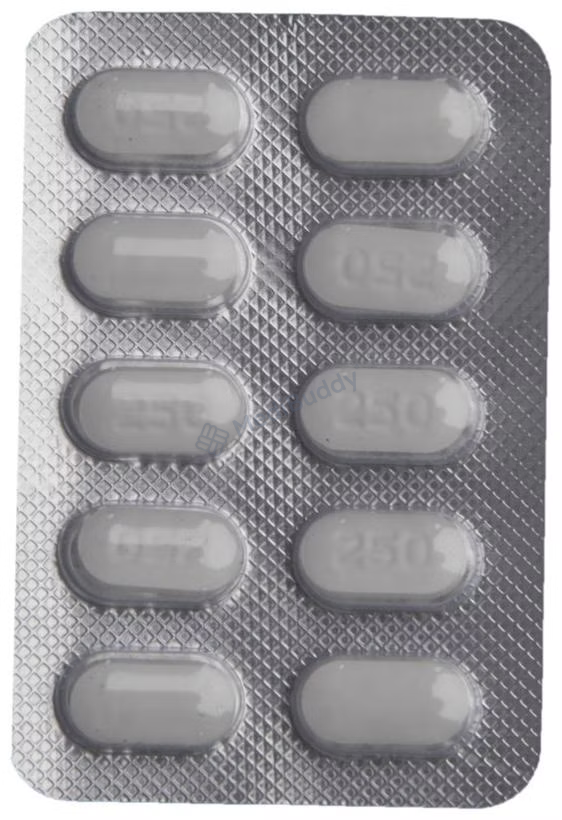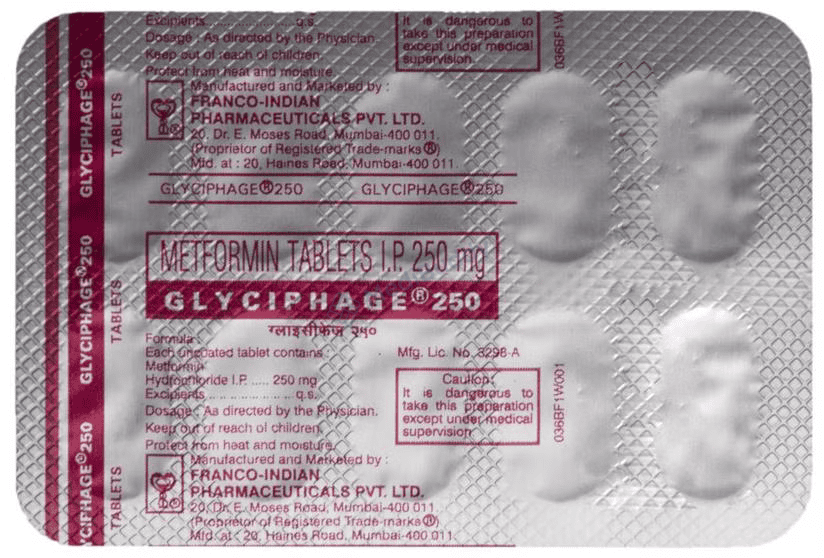Glyciphage 250 Tablet
By Glyciphage
Rx
10 Tablet in a Strip

Composition
Metformin(250mg)

Manufacturer - Franco-Indian Pharmaceuticals Pvt Ltd
20, Dr. E. Moses Road, Mahalaxmi, Mumbai - 400 011

Expires on or after
August, 2027
About Glyciphage 250 Tablet
Glyciphage 250 Tablet is a medication mainly used in the management of type 2 diabetes mellitus, a chronic condition that affects how the body processes glucose. This tablet is effective in controlling blood sugar levels, which helps prevent serious complications associated with diabetes. Additionally, Glyciphage 250 Tablet is also prescribed to women suffering from Polycystic ovary syndrome (PCOS), a disorder related to menstruation.
It is recommended to take Glyciphage 250 Tablet with food to reduce the risk of side effects like nausea and abdominal pain. Consistency in taking the medication at the same time each day is crucial for maximum benefit. It is important not to discontinue the medication without consulting a healthcare provider. A healthy lifestyle, including following a recommended diet and exercise program, is essential in managing diabetes while on this medication.
Common side effects of Glyciphage 250 Tablet may include nausea, vomiting, taste changes, diarrhea, abdominal pain, and loss of appetite. Individuals may experience hypoglycemia (low blood sugar) when combining this medication with other antidiabetic drugs, alcohol, or in case of meal skipping. Monitoring blood sugar levels regularly is advised while on this medication.
Before starting Glyciphage 250 Tablet, inform your doctor about any existing kidney, liver, or heart issues. Pregnant or breastfeeding women should also seek medical advice prior to its use. Regular kidney function tests may be recommended by the doctor. Limiting alcohol intake is advised to lower the risk of potential side effects.
Glyciphage 250 Tablet belongs to a group of anti-diabetic medicines called biguanides. It helps improve the body's response to insulin, reduce blood sugar production by the liver, and delay sugar absorption in the stomach or intestines. In cases where diet and exercise alone are insufficient in controlling blood sugar levels for type 2 diabetes patients, Glyciphage 250 Tablet is usually prescribed as a first-line therapy. Additionally, it is also used off-label in women with PCOS to regulate hormonal balance, normalize menstrual cycles, lower blood sugar levels, and stimulate ovulation.
In general, Glyciphage 250 Tablet is well-tolerated, with common side effects such as diarrhea, nausea, vomiting, or a metallic taste in the mouth. However, in rare cases, it may lead to lactic acidosis, characterized by symptoms like dizziness, drowsiness, and muscle pain. Individuals should be cautious of potential hypoglycemia when combining this medication with intense exercise, excessive alcohol consumption, or skipped meals. Effective management of type 2 diabetes with Glyciphage 250 Tablet is enhanced by maintaining a healthy lifestyle, including weight loss for overweight individuals, low-calorie diet, and regular physical activity.
Benefits
Glyciphage 250 Tablet is a medication that belongs to the biguanides class and is used in the treatment of Type 2 diabetes mellitus. This medication works effectively in managing diabetes by lowering the production of glucose in the liver, delaying the absorption of sugar from the intestines, and enhancing the body's sensitivity to insulin. By helping to lower blood glucose levels, Glyciphage 250 Tablet plays a crucial role in diabetes management. By maintaining control over blood sugar levels, one can reduce the risk of severe complications associated with diabetes such as kidney damage, eye damage, nerve problems, and the risk of limb amputation.
One of the key benefits of Glyciphage 250 Tablet is its ability to help individuals live a normal and healthy life by combining the effects of the medication with a proper diet and regular exercise routine. Unlike other anti-diabetic medications like sulfonylureas or insulin, Glyciphage 250 Tablet does not lead to sudden drops in blood sugar levels or significant hypoglycemia. Additionally, it does not cause weight gain, making it a favorable option for those concerned about weight management. In fact, Glyciphage 250 Tablet may even aid in modest weight loss for some individuals.
Another significant benefit of Glyciphage 250 Tablet is its role in preventing serious complications of diabetes such as kidney damage (Diabetic Nephropathy), visual impairment (Diabetic Retinopathy), nerve damage resulting in loss of sensation in extremities (Diabetic Neuropathy), and the risk of foot amputation. Moreover, Glyciphage 250 Tablet can also help reduce the likelihood of heart attacks or strokes, further emphasizing its importance in overall diabetes management.
Overall, Glyciphage 250 Tablet is a valuable medication for individuals with Type 2 diabetes mellitus as it not only helps in controlling blood sugar levels but also contributes to preventing debilitating complications associated with the condition. When used consistently alongside a healthy lifestyle, Glyciphage 250 Tablet can significantly improve the quality of life for individuals managing diabetes.
How to use the Glyciphage 250 Tablet
When using Glyciphage 250 Tablet, it is important to follow your doctor's instructions regarding the dose and duration of the medication. Swallow the tablet whole with a full glass of water and always take it with food. Do not chew, crush, or break the tablet, as this can affect how the medication works in your body.
For Glyciphage 250 Tablet 10's, only use this medication if prescribed by your doctor. Take this tablet with meals to help reduce any stomach or bowel side effects, or as directed by your doctor. Your doctor will determine how often you should take the tablets based on your specific medical condition. Remember to swallow the tablet with a full glass of water to ensure proper absorption.
When using Glyciphage 250 Tablet, follow your physician's advice on the dose and timing. Swallow the tablet with a glass of water and do not crush or chew it. Your doctor will tailor the correct dose and duration of the medication based on factors such as your age, body weight, and the specific disease condition being treated. It is important not to discontinue the use of Glyciphage 250 Tablet without consulting your doctor first.
Uses of Glyciphage 250 Tablet
Glyciphage 250 Tablet is primarily used for the treatment of Type 2 diabetes mellitus, a condition characterized by high blood sugar levels. It is specifically utilized when dietary changes, physical activity, and a single medication alone do not effectively control blood sugar levels. By managing Type 2 diabetes mellitus, Glyciphage 250 Tablet helps in achieving better control over blood sugar levels for individuals who require additional support beyond lifestyle modifications and single-agent therapy.
What conditions Glyciphage 250 Tablet treats?
Glyciphage 250 Tablet is commonly used to treat Type 2 diabetes, a chronic condition where the body has trouble using insulin effectively. This type of diabetes is more prevalent in middle-aged and older individuals and is also known as adult-onset diabetes. Symptoms may include increased thirst, frequent nighttime urination, slow wound healing, increased hunger, fatigue, and blurred vision. Complications of Type 2 diabetes can lead to nerve problems, kidney issues, eye damage or blindness, limb loss, sexual dysfunction, and increased risk of heart attack or stroke.
Should you consult a doctor?
Seek medical attention if you have type 1 diabetes mellitus or diabetic ketoacidosis, uncontrolled diabetes accompanied by symptoms like nausea, vomiting, rapid weight loss, diarrhea, lactic acidosis, or ketoacidosis. Avoid Glyciphage 250 Tablet if you are dehydrated or have a severe infection affecting vital organs. Inform your doctor before taking this medication if recovering from recent injury, surgery, infection with fever, or experiencing stress. Additionally, disclose if you have glucose-6-phosphate dehydrogenase (G6PD) deficiency or factors that may lead to low blood sugar levels. These factors include undernourishment, irregular meal times, missed meals, fasting, dietary changes, and hormone-induced disorders.
Side effects of Glyciphage 250 Tablet
When taking Glyciphage 250 Tablet, some individuals may experience side effects. These side effects are usually temporary and may go away as your body gets used to the medication. Common side effects include diarrhea, nausea, vomiting, and flatulence. Digestive problems like abdominal pain, loss of appetite, and taste disturbances may also occur. In some cases, there may be low blood sugar levels, signs of reduced red or white blood cells, decreased vitamin B12 levels, and skin issues such as rashes, redness, or itching. It's important to consult your doctor if you notice persistent side effects or are concerned about them. Stop taking Glyciphage 250 Tablet and seek immediate medical help if you experience severe side effects like lactic acidosis, liver inflammation, severe allergic reactions, or dangerously low blood sugar levels that could lead to loss of consciousness or seizures. Your doctor can provide further guidance in managing these side effects.
Safety advice

liver
Glyciphage 250 Tablet may not be safe for individuals with liver disease and it is advisable to avoid using this medication if you have such a condition. It is recommended to seek advice and guidance from your doctor regarding the use of Glyciphage 250 Tablet in case of liver issues.

kidney
Glyciphage 250 Tablet should be used carefully if you have kidney disease. Adjusting the dose may be necessary, so talk to your doctor. It's not advisable for people with severe kidney disease to use this medication.

alcohol
It is not safe to drink alcohol while taking Glyciphage 250 Tablet.

driving
If you experience low or high blood sugar symptoms while taking Glyciphage 250 Tablet, avoid driving as it may affect your ability to drive safely.

pregnancy
Glyciphage 250 Tablet is commonly believed to be safe for use during pregnancy. Animal studies have demonstrated minimal risks to the baby, but human studies are limited. It is advisable to consult a healthcare provider.

breastfeeding
During breastfeeding, caution is advised when using Glyciphage 250 Tablet. It is recommended to pause breastfeeding until the mother's treatment is finished and the drug is fully cleared from her system.
Age above 75(Geriatrics)
Glyciphage 250 Tablet is not recommended for use in elderly patients (aged 75 years or above) and it should be used with caution in elderly patients (aged 65 years or above), especially in patients with impaired kidney function. Your doctor may assess your kidney function more frequently during treatment with Glyciphage 250 Tablet. Consult your doctor before taking Glyciphage 250 Tablet.
Age below 6 months(Pediatrics)
Glyciphage 250 Tablet is generally not recommended for use in children and adolescents (under 18 years of age). Consult child’s doctor for advice.
Consumption warning before consuming Glyciphage 250 Tablet
Before consuming Glyciphage 250 Tablet , it is crucial to be aware of potential risks. Some diabetic individuals may experience lactic acidosis, a serious condition where there is an excess buildup of lactic acid in the blood. Proper liver and kidney function is necessary for removing this excess lactic acid. If you have kidney disease, refrain from taking metformin, the active ingredient in the tablet, as indicated by a blood test. Additionally, this medication can lead to decreased levels of vitamin B-12, making it vital to undergo annual blood tests to monitor both blood and vitamin levels. Combining Glyciphage 250 Tablet with insulin may significantly reduce blood sugar levels, potentially requiring a dosage adjustment by a healthcare provider.
Disease interactions
When considering Glyciphage 250 Tablet 10's, it is crucial for individuals with specific health conditions to be mindful of potential interactions. Patients who have heart diseases such as congestive heart failure and myocardial infarction, as well as those with Vitamin B12 deficiency and alcoholism, should avoid taking Glyciphage 250 Tablet 10's. These conditions can potentially affect how the medication works in the body and may lead to adverse effects. It is important for individuals with these conditions to consult their healthcare provider before using Glyciphage 250 Tablet 10's to ensure their safety and well-being.
What if you forgot to take Glyciphage 250 Tablet?
If you forget to take your Glyciphage 250 Tablet, try to take it as soon as you remember. But if it's close to your next scheduled dose, then skip the missed one and continue with your usual dosing routine. Avoid taking a double dose to make up for the missed one, as this can lead to unwanted side effects. It's important to stay consistent with your medication schedule for the best results.
What happens if you take overdose of Glyciphage 250 Tablet?
If too much Glyciphage 250 Tablet is taken, it is important to seek immediate medical help by contacting a doctor or going to the nearest hospital. Overdosing on Glyciphage 250 Tablet can lead to low blood sugar levels and pose a risk of life-threatening condition known as lactic acidosis. Symptoms of lactic acidosis may include vomiting, abdominal pain accompanied by muscle cramps, overall feeling of unwellness with extreme fatigue, decreased body temperature, slow heartbeat, and breathing difficulties. It is crucial to address any concerns related to potential overdose promptly to ensure appropriate medical intervention and care.
Related lab tests
When taking Glyciphage 250 Tablet, it is important to monitor your glucose levels regularly through certain lab tests. The first test is Glucose-Fasting Blood, which measures the amount of sugar in your blood after not eating for at least eight hours. This test helps evaluate how well your body is managing blood sugar levels when you have not consumed any food. Another important test is Glucose-Postprandial Blood, which checks your blood sugar levels two hours after a meal. This test shows how your body processes sugar after eating, giving valuable insights into your overall blood sugar control throughout the day. Finally, Glycosylated Hemoglobin is a test that measures the average blood sugar levels over the past two to three months. This test can provide a more comprehensive view of your long-term blood sugar control, offering crucial information for managing conditions like diabetes. Regular monitoring of these relevant lab tests can help you and your healthcare provider make informed decisions about your treatment and overall health.
Related Lab Tests:
1. Glucose-Fasting Blood
2. Glucose-Postprandial Blood
3. Glycosylated Hemoglobin
Additional Information
| Habit Forming | No |
| Chemical Class | Biguanide derivative |
| Therapeutic Class | ANTI DIABETIC |
| Action Class | Biguanides |
FAQs
Disclaimer
The information provided on this website is to the best of our abilities to ensure it is accurate, reliable, and reviewed by a team of professionals. It should not be used to diagnose, prevent, or cure any health problem. The information presented here is not intended to create a doctor-patient relationship or replace a registered medical practitioner's advice, diagnosis, or treatment. The absence or provision of any information or warning regarding any medicine should not be assumed as an implied or explicit assurance of safety or efficacy. We highly recommend consulting your registered medical practitioner for all queries or doubts related to your medical condition. Do not ignore professional medical advice or delay seeking it based on the content encountered on our website. We intend to support, not replace, the doctor-patient relationship.
₹13.41
₹14.9
10% OFF
Inclusive of all taxes
Content verified by

Dr. Upasana Bhatia
MBBS - General Medicine
Last update on 01-Oct-2024












